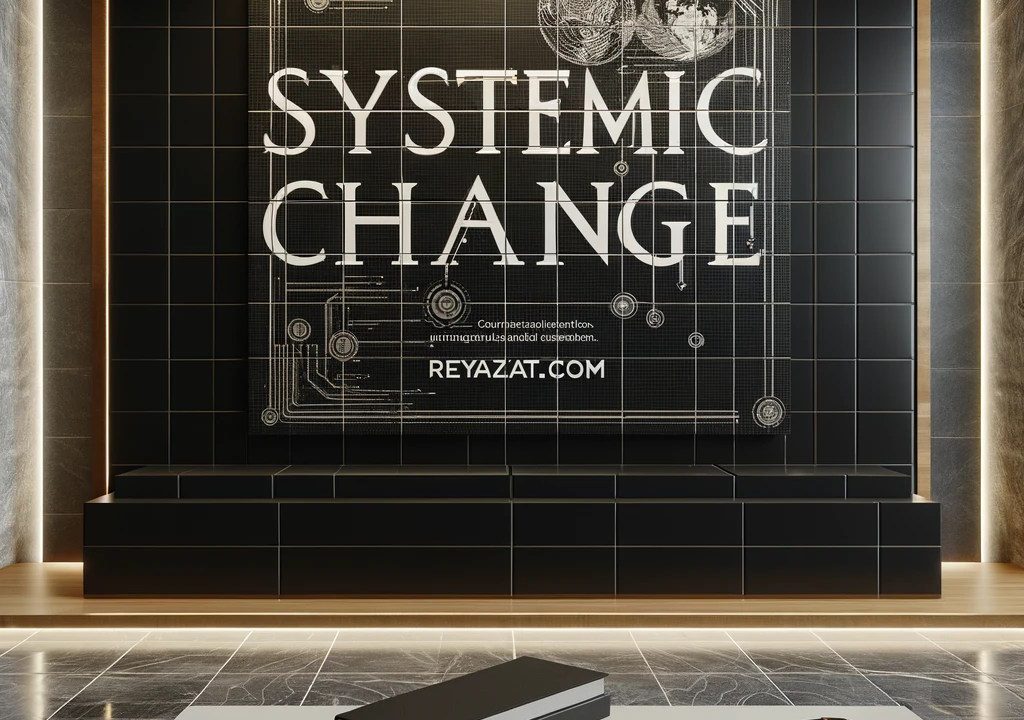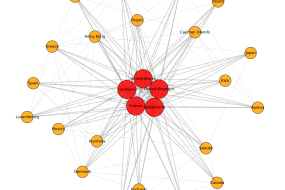
“Shaping the Future: The Critical Role of Purpose-Driven Entrepreneurship in Achieving Systemic Change”
Dr Farhad Reyazat – London School of Banking & Finance
September 2023
Purpose-driven entrepreneurship represents a transformative approach where entrepreneurs align their business endeavors with broader societal and environmental goals. It’s about creating ventures that seek profit and address the pressing challenges of our times, such as climate change, social inequality, and economic disparities. The essence of this approach lies in its focus on sustainability, innovation, and ethical practices, aiming to build enterprises that contribute positively to the world. This movement is gaining momentum, driven by a growing recognition of the interconnectedness of business success and societal well-being, urging entrepreneurs to act as agents of change in the global landscape.
Purpose-driven entrepreneurship transforms the business landscape by prioritising sustainability and profit in the current era. This new wave of entrepreneurs focuses on positively impacting society and the environment through innovative solutions, such as renewable energy and waste reduction strategies. Embracing the triple bottom line approach, these businesses measure success by their impact on profit, people, and the planet. Their commitment to ethical practices builds consumer trust and attracts talent motivated by meaningful work. Additionally, purpose-driven enterprises encourage a broader shift towards sustainable practices by influencing industry norms and meeting regulatory requirements. Collaboration with various organisations amplifies their impact, contributing to a legacy of a more equitable, environmentally conscious world. The rise of purpose-driven entrepreneurship signifies a shift towards integrating sustainability as a core element of successful business models, driving innovation that addresses global challenges.
- Why do we need Purpose-driven Entrepreneurs?
The imperative for Purpose-Driven Entrepreneurship has never been more critical in our global economy, plagued by environmental degradation, social inequality, and economic disparities. This movement seeks to integrate social and environmental goals with business objectives, fostering innovative solutions that benefit society. Purpose-driven entrepreneurs are encouraged to look beyond profit, considering the broader impact of their operations on the planet and its people. By adopting ethical practices and focusing on sustainable development, they are at the vanguard of addressing global challenges, striving for a more equitable and sustainable future.
Research from Deloitte Insights highlights that purpose-driven companies achieve higher market share gains, grow three times faster than their competitors, and have higher employee and customer satisfaction. Such companies are characterized by their longevity, authenticity, and ability to maintain relevance and loyalty among consumers. Moreover, purpose-oriented companies report 30% higher levels of innovation and 40% higher levels of workforce retention. Unilever’s “sustainable living” brands exemplify this, having grown 69% faster than the rest of the business in 2018, by focusing on reducing environmental footprint and increasing social impact.
Statistics from Business of Purpose show that brands committed to improving quality of life outperform the stock market by 120%. Purpose-led brands have seen their valuation surge by 175% over the past 12 years, underscoring purpose-driven business practices’ financial and societal benefits. Furthermore, certified B Corps experienced a 51% revenue growth rate during the 2008 financial crisis, demonstrating the resilience and appeal of purpose-driven businesses in challenging economic times.
The United Nations’ Sustainable Development Goals (SDGs) offer a vital framework for purpose-driven entrepreneurship, with 17 goals ranging from eradicating poverty to ensuring sustainable consumption. By aligning their business strategies with the SDGs, entrepreneurs contribute directly to addressing global challenges, opening up new market opportunities, and fostering innovation in response to societal needs. This alignment not only aids in achieving the SDGs but also showcases the significant role of businesses in sustainable development and the importance of integrating sustainability into core business strategies.
In summary, the shift towards Purpose-Driven Entrepreneurship is essential for tackling the pressing challenges of our time, offering a path towards a sustainable and prosperous future for all. The combined insights from Deloitte, Business of Purpose, and the principles outlined by the SDGs highlight the significant advantages and necessity of adopting purpose-driven business models.
- Promoting purpose-driven entrepreneurship
Promoting Purpose-Driven Entrepreneurship is essential for creating a business culture that values societal and environmental benefits as much as financial profits. This integrated approach involves several strategic efforts to nurture an environment where businesses strive to positively impact society and the environment, alongside their economic success.
Education and Awareness
To cultivate an understanding and appreciation for purpose-driven entrepreneurship, enhancing awareness about its significance and benefits is critical. This can be achieved through workshops, seminars, and online platforms that showcase successful case studies. Incorporating sustainability and social entrepreneurship courses in academic institutions can also equip future business leaders with the mindset and skills necessary for this entrepreneurial approach.
Supportive Ecosystems
Creating incubators, accelerators, and mentorship programs specifically tailored for purpose-driven startups provides essential resources and guidance. Access to finance through dedicated funds and impact investing is also crucial. The Global Impact Investing Network (GIIN) reports that the impact investing market reached USD 1.164 trillion in 2022, highlighting the increasing availability of financial support for businesses committed to positive societal and environmental outcomes.
Policy and Incentives
Government policies play a significant role in promoting purpose-driven entrepreneurship. Tax incentives, subsidies, and grants for businesses that contribute positively to society and the environment can encourage more companies to adopt sustainable practices. Policies that mandate sustainability reporting and adherence to ESG criteria further support this transition. Governments worldwide have been implementing tax incentives to support sustainable business practices. For instance, the European Union offers various tax benefits for green energy projects, aiming to reduce greenhouse gas emissions by 55% by 2030 compared to 1990. In another example, The United States Small Business Administration (SBA) provides grants for businesses focused on research and development in the environmental sector, which could be a significant boost for purpose-driven startups.
Community and Network Building
Building a strong community of purpose-driven entrepreneurs through networking events and collaborative platforms facilitates knowledge sharing and support. Partnerships between businesses, non-profits, governmental agencies, and the private sector can address societal and environmental issues more effectively. A study by the World Economic Forum highlighted that public-private partnerships are pivotal in achieving the Sustainable Development Goals (SDGs), with several billion dollars already being mobilized annually through such collaborations.
Recognition and Visibility
Acknowledging and promoting the achievements of purpose-driven businesses through awards and media coverage raises their visibility and validates their impact. This recognition encourages more entrepreneurs to adopt a purpose-driven approach. For example, The B Corporation certification has become recognized for purpose-driven businesses, with over 3,500 certified B Corps worldwide. These companies have seen increased visibility and consumer trust, translating into financial growth. Unilever’s “Sustainable Living” brands, which focus on reducing environmental impact and improving social well-being, are growing 50% faster than their other brands and delivering more than 60% of the company’s growth.
Technology and Innovation
Leveraging technology and innovation to address social and environmental challenges can lead to scalable and efficient solutions. Supporting research and development in sustainable technologies and business models paves the way for future purpose-driven innovations.
As reported by Allied Market Research, the projected growth of the impact investing market to $6 trillion by 2031, underscores the increasing demand for investments that offer financial returns alongside social and environmental impact. This trend suggests a promising future for purpose-driven entrepreneurship, driven by a growing awareness of global challenges and businesses’ pivotal role in addressing them. By adopting these strategies, society can foster an environment where purpose-driven entrepreneurship not only thrives but becomes the norm, promising a more sustainable, equitable, and prosperous future for all.
- Systemic Change and Purpose-driven Entrepreneurship
The role of systemic change in Purpose-Driven Entrepreneurship (PDE) is a fundamental aspect that addresses the underlying structures influencing societal and environmental issues. PDE goes beyond individual and organizational efforts to foster changes that impact broader systems. This approach aims to transform how businesses, economies, and societal norms operate, ensuring a sustainable future for all.
Understanding Systemic Change
Systemic change involves altering the frameworks and institutions that dictate societal functions and businesses. For instance, according to the World Economic Forum, integrating sustainability into businesses’ core strategy could unlock economic opportunities worth $12 trillion annually by 2030. This highlights the economic potential of addressing systemic challenges through sustainable business practices.
The Economic Rationale
The transition towards a low-carbon, sustainable economy necessitates systemic changes across industries. The International Renewable Energy Agency (IRENA) estimates that doubling the global share of renewable energy by 2030 could increase global GDP by up to 1.1%, equivalent to $1.3 trillion. This underscores the economic benefits of systemic shifts towards sustainability, fostering an environment where PDE can thrive.
Policy and Regulation
Government policies play a pivotal role in facilitating systemic change. The introduction of global carbon pricing mechanisms, covering about 20% of global greenhouse gas emissions, demonstrates how policy can drive systemic changes in the market, encouraging businesses to innovate and reduce emissions. Such regulatory frameworks create a conducive environment for purpose-driven businesses to innovate and scale their impact.
Investment in Innovation
Purpose-driven entrepreneurs often lead the way in developing innovative solutions to systemic challenges. Global impact investing, valued at $715 billion by the Global Impact Investing Network (GIIN) in 2020, showcases the growing investor interest in businesses contributing to systemic change. This investment trend signals a shift in capital allocation towards ventures that positively impact society and the environment.
Collaborative Efforts and Partnerships
The complexity of systemic challenges requires collaboration across sectors. The United Nations’ 17 Sustainable Development Goals (SDGs) serve as a universal call to action, urging public-private partnerships to address global issues. The success of such collaborations is evident in initiatives like the SDG500, a $500 million investment platform aiming to accelerate progress towards the SDGs through innovative finance and entrepreneurship.
Success Stories
Companies like Patagonia and Ben & Jerry’s exemplify how businesses can drive systemic change. By committing to sustainable business practices and advocating for environmental conservation and social justice, these companies influence other businesses and policymakers, promoting a shift towards more sustainable economic systems.
The role of systemic change in Purpose-Driven Entrepreneurship is indispensable for achieving a sustainable future. Purpose-driven entrepreneurs can drive significant, lasting impacts by addressing the root causes of societal and environmental issues. The increasing economic rationale, supportive policies, investments in innovation, collaborative efforts, and successful case studies all underscore the importance of systemic change. As more businesses and investors recognize the value of addressing systemic challenges, the momentum towards a more sustainable and equitable world continues to grow, demonstrating the transformative potential of purpose-driven entrepreneurship.
Conclusion
Purpose-driven entrepreneurship (PDE) fundamentally reshapes the business world, aligning profit with societal and environmental goals. This approach offers a pathway to address critical challenges like climate change and social inequality and demonstrates a strong business case for sustainability. Purpose-driven companies have been shown to grow three times faster than their competitors, with Unilever’s sustainable living brands leading by example, significantly contributing to the company’s growth. The economic rationale for PDE is further underscored by projections from the International Renewable Energy Agency (IRENA), which suggest that a shift towards renewable energy could significantly boost global GDP. Moreover, the Global Impact Investing Network (GIIN) highlights a growing trend in investments aimed at generating positive, measurable impacts alongside financial returns, with the impact investing market projected to reach $6 trillion by 2031. Collaborative efforts, particularly those aligned with the United Nations’ Sustainable Development Goals (SDGs), are crucial for achieving systemic change. Initiatives like the SDG500 investment platform illustrate the potential of combining innovative finance and entrepreneurship to accelerate progress towards these goals.
In conclusion, PDE is not just a trend but a movement toward creating a more sustainable, equitable, and prosperous future. With increasing recognition of the interconnectedness between business success and societal well-being, entrepreneurs are urged to become change agents. As more businesses and investors recognize the value of purpose-driven models, we witness a significant shift towards sustainable practices that promise to transform the global landscape.
References
– Deloitte. (2020). 2020 Global Marketing Trends. [online] Available at: Deloitte 2020 Global Marketing Trends Report: Seven Key Trends to Help C-suite Leaders Place Humans at the Center of Their Work | Deloitte China
– The Global Impact Investing Network (GIIN). (2022). Annual Impact Investor Survey 2022. [online] Available at: GIINsight: Sizing the Impact Investing Market 2022 | The GIIN
– International Renewable Energy Agency (IRENA). (2021). Renewable Energy Benefits: Leveraging Local Capacity for Onshore Wind. [online] Available at: Renewable Energy Statistics 2021 (irena.org)
– United Nations. (2015). Sustainable Development Goals. [online] Available at: THE 17 GOALS | Sustainable Development (un.org)
– World Economic Forum. (2017). The Business Case for the Sustainable Development Goals. [online] Available at: What are the Sustainable Development Goals? | World Economic Forum (weforum.org)
– Business of Purpose. (2020). Purpose-led Brand Valuation Report. [online] Available at: Statistics — Business of Purpose






One reply on “Shaping the Future: The Critical Role of Purpose-Driven Entrepreneurship in Achieving Systemic Change”
[…] AI is playing a crucial role in advancing environmental sustainability. Through data analytics and machine learning, AI helps entrepreneurs identify and implement more sustainable practices across various industries. From optimizing energy use in manufacturing to monitoring deforestation and predicting climate change impacts, AI enables businesses to minimize their environmental footprint while contributing to a healthier pl… […]